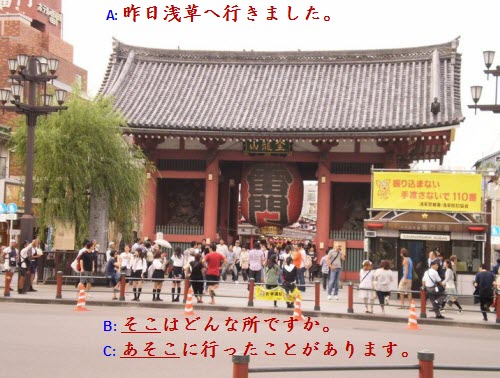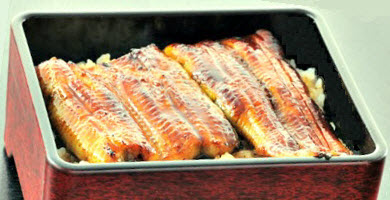- Home
- Intermediate Lessons
- Japanese Demonstrative Expression
Japanese Demonstrative Expression
そ and あ -
Intermediate Lessons: 32
You will learn about the Japanese Demonstrative Expression using そ (so) and あ (a) in this lesson.

If you can still remember, Japanese demonstrative pronouns and demonstrative adjectives were introduced in basic lesson 4 where you learned about これ (kore) それ (sore) あれ (are) / この (kono) その (sono) あの (ano) / ここ (koko) そこ (soko) あそこ (asoko).
In daily conversations, we often refer to something we have mentioned in our previous sentences. Depending on situations, you'll use either そ (so) or あ (a) to refer to that "something".
When to use Japanese Demonstrative Expression with そ (so)
When only the speaker or the listener knows about the topic, "そ"-series of words 「それ (sore) その (sono) そこ (soko), etc」 are used to point out that topic. For example...
- A: 昨日浅草へ行きました。
kinou asakusa e ikimashita
Meaning: I went to Asakusa yesterday.
B: そこはどんな所ですか。
soko wa donna tokoro desu ka
Meaning: What kind of place is that?
In the above example, B doesn't know what or where the place 浅草 Asakusa (where A went to yesterday) is. Therefore B uses the "そ"-series word そこ (soko) to refer to that place.
- A: 私は昨夜一風堂で晩御飯を食べました。
watashi wa yuube ippuudou de bangohan wo tabemashita
Meaning: I ate my dinner at Ippudo yesterday night.
B: そこは日本のレストランですか。
soko wa nihon no resutoran desu ka
Meaning: Is that place a Japanese restaurant?
Similarly in the above example, although B knows that 一風堂 Ippudo is a place for eating, he doesn't know what or where the place is. Therefore B uses そこ (soko) to refer to that place.
- A: 土曜日に鈴木さんに会う予定です。
doyoubi ni suzuki san ni au yotei desu
Meaning: I am going to meet Ms Suzuki on Saturday.
B: その人はあなたの同僚ですか。
sono hito wa anata no douryou desu ka
Meaning: Is that person your colleague?
B doesn't know Ms Suzuki, whom A is going to meet on Saturday. Therefore B uses the "そ"-series word その (sono) to refer to that person.
- A: 東京でうなじゅうを食べました。
toukyou de unajuu wo tabemashita
Meaning: I ate unaju in Tokyo.
B: それはどんな食べ物ですか。
sore wa donna tabemono desu ka
Meaning: What kind of food is that?
Although B knows that うなじゅう (unajuu) is a type of food, he doesn't know exactly what kind of food it is. Therefore B uses the "そ"-series word それ (sore) to point out the food in his question to A.
When to use Japanese Demonstrative Expression with あ (a)
On the other hand, "あ"-series of words 「あれ (are) あの (ano) あそこ (asoko), etc」 are used to refer to something/someone/somewhere that both the speaker and the listener have knowledge of.
Let's use the same four examples above so that you can see the difference between using そ (so) and あ (a).
- A: 昨日浅草へ行きました。
kinou asakusa e ikimashita
Meaning: I went to Asakusa yesterday.
B: あそこに行ったことがあります。
asoko ni itta koto ga arimasu
Meaning: I have been to that place.
In this case, B also knows the place 浅草 Asakusa and says that he has been there before. Therefore he can use the "あ"-series of word あそこ (asoko) to refer to that place.
- A: 私は昨夜一風堂で晩御飯を食べました。
watashi wa yuube ippuudou de bangohan wo tabemashita
Meaning: I ate my dinner at Ippudo yesterday night.
B: あそこはいいレストランですね。私もよく行きます。
asoko wa ii resutoran desu ne. watashi mo yoku ikimasu
Meaning: That place is a nice restaurant. I often go there too.
Similarly, in the above example, B also knows the restaurant 一風堂 Ippudo and says that he often go there too. Therefore he uses あそこ (asoko) to refer to the restaurant.
- A: 土曜日に鈴木さんに会う予定です。
doyoubi ni suzuki san ni au yotei desu
Meaning: I am going to meet Ms Suzuki on Saturday.
B: あの人はきれいですね。
ano hito wa kirei desu ne
Meaning: That person is beautiful.
B also knows about the person (Ms Suzuki), whom A is going to meet on Saturday. Therefore he can use the "あ"-series of word あの (ano) to comment on that same person.
- A: 東京でうなじゅうを食べました。
toukyou de unajuu wo tabemashita
Meaning: I ate unaju in Tokyo.
B: 羨ましい。あれは本当に美味しいですね。
urayamashii. are wa hontou ni oishii desu ne
Meaning: I am so envious of you. That is really delicious.
B also knows the food うなじゅう (unajuu) which A has eaten in Tokyo. Therefore he can use the "あ"-series of word あれ (are) to refer to the food.
[鰻重 (unajuu) is a Japanese dish consists of steamed white rice topped with eel or 鰻 (unagi) grilled with sweet Teriyaki sauce, and served in a lacquered food box called 重箱 (juubako)]

Summary
In summary, the Japanese demonstrative expression using そ (so) is used when only one party (speaker or listener) knows the topic.
When both the speaker and listener have knowledge of the topic, the Japanese demonstrative expression using あ (a) is used instead.
Related Page
Basic Lesson 4: Japanese Demonstrative Pronouns and Adjectives.
Mystery Sales! Get 45% Forever OFF Premium & Premium PLUS! Ends on 20 Feb 2026
The link above is an affiliate link, which means that I would earn a commission (at no extra cost to you) if you do end up purchasing the related learning course.
Buy me a coffee







